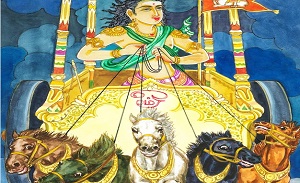Know the Self: Lord Of the Chariot
 The following is from the translation of Katha Upanishad by S. Radhakrishnan. This Upanishad belongs to the KrishnaYajurveda. The verses follow Lord Yama as he fulfills young Nachiketa’s third wish—to understand the mystery of death. In the first chapter of Section 1, for his second wish, Yama had taught (and named after him) the immortality-granting “Nachiketa fire sacrifice.” The following verses, 1 to 17, are drawn from Chapter 3 and have been lightly edited for clarity.
The following is from the translation of Katha Upanishad by S. Radhakrishnan. This Upanishad belongs to the KrishnaYajurveda. The verses follow Lord Yama as he fulfills young Nachiketa’s third wish—to understand the mystery of death. In the first chapter of Section 1, for his second wish, Yama had taught (and named after him) the immortality-granting “Nachiketa fire sacrifice.” The following verses, 1 to 17, are drawn from Chapter 3 and have been lightly edited for clarity.
1. Lord Yama: “There are two selves that drink the fruit of karma in the world of good deeds. Both are lodged in the secret place of the heart, the seat of the Supreme. The knowers of Brahman speak of them as shadow and light, as also do the householders who perform the triple Nachiteka fire sacrifice.
2. “May we master that Nachiteka fire which is the bridge to Brahman for those who perform sacrifices, a passageway for those who wish to cross over to that farther, fearless shore.
3. “Know the Self as the lord of the chariot and the body as the chariot itself. Know the intellect as the charioteer and the mind as the reins.
4. “The senses, they say, are the horses, and the objects of sensation are the paths over which they run. When the sense of self is associated with the body, the senses and the mind—this wise men call ‘the enjoyer.’
5. “He who has no understanding, whose mind is always unrestrained, his senses are out of control, as wicked horses are for a charioteer.
6. “He, however, who has understanding, whose mind is always restrained, his senses are under control, as good horses are for a charioteer.
7. “He who has no understanding, who has no control over his mind and is ever impure, reaches not that goal but comes back into mundane life.
8. “He, however, who has understanding, who has control over his mind and is ever pure, reaches that goal from which he is not born again.
9. “He who has the understanding for the driver of the chariot and controls the reins of his mind, he reaches the end of the journey, that supreme abode of the All-Pervading.
10. “Beyond the senses are the objects of the senses; beyond the objects is the mind; beyond the mind is the understanding; beyond the understanding is the Atman.
11. “Beyond the great Atman is the Unmanifest; beyond the Unmanifest is the Cosmic Soul. Beyond the Cosmic Soul there is nothing. That is the end of the journey; that is the final goal.
12. “The Self, though hidden in all beings, does not shine forth but can be seen by those subtle seers, through their sharp and subtle intelligence.
13. “The wise man should restrain speech in mind; the latter he should restrain in the understanding self. The understanding he should restrain in the great self. That he should restrain in the tranquil self.
14. “Arise, awake, having attained thy boons, understand them. Sharp as the edge of a razor and hard to cross, difficult to tread is that path, sages declare.
15. “The Self is without sound, without touch and without form, undecaying; is likewise without taste, eternal, without smell, without beginning, without end, beyond the great, abiding. By discerning That, one is freed from the face of death.
16. “This ancient story of Nachiketas, told by Death, telling and hearing it, a wise man grows great in the world of Brahma.
17. “Whoso shall cause to be recited this supreme secret before an assembly of brahmins or devoutly at the time of the ceremonies for the dead, this will prepare for him everlasting life, this will prepare everlasting life.”
https://www.hinduismtoday.com/

